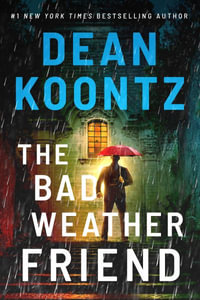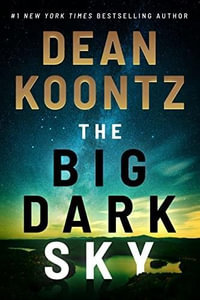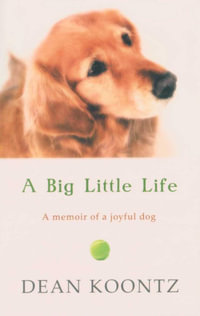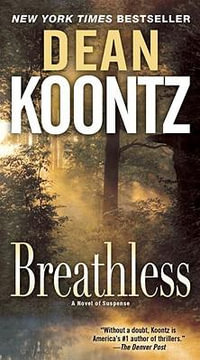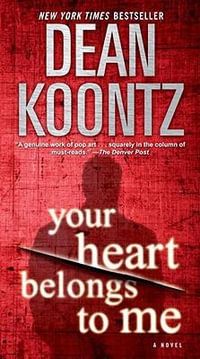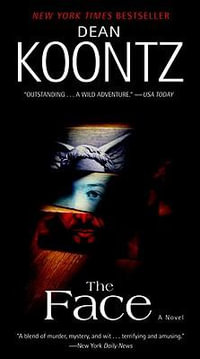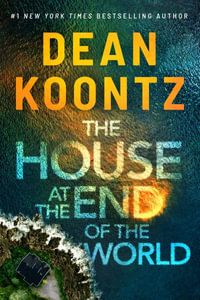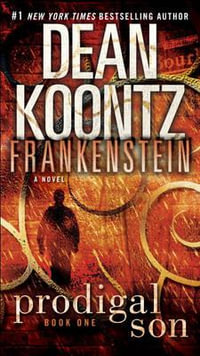
At a Glance
432 Pages
23 x 107 x 189
Paperback
$25.75
or 4 interest-free payments of $6.44 with
Ships in 10 to 15 business days
The legend began in the obscure little town of Pico Mundo. A fry cook named Odd was rumored to have the extraordinary ability to communicate with the dead. Through tragedy and triumph, exhilaration and heartbreak, word of Odd Thomas’s gifts filtered far beyond Pico Mundo, attracting unforgettable new friends - and enemies of implacable evil. With great gifts comes the responsibility to meet great challenges. But no mere human being was ever meant to face the darkness that now stalks the world - not even one as oddly special as Odd Thomas.
After grappling with the very essence of reality itself, after finding the veil separating him from his soul mate, Stormy Llewellyn, tantalizingly thin yet impenetrable, Odd longed only to return to a life of quiet anonymity with his two otherworldly sidekicks - his dog Boo and a new companion, one of the few who might rival his old pal Elvis. But a true hero, however humble, must persevere. Haunted by dreams of an all-encompassing red tide, Odd is pulled inexorably to the sea, to a small California coastal town where nothing is as it seems. Now the forces arrayed against him have both official sanction and an infinitely more sinister authority…and in this dark night of the soul, dawn will come only after the most shattering revelations of all.
About the Author
Dean Koontz is an international household name, a brilliantly gifted storyteller whose books have been bestsellers in many countries, selling seventeen million copies each year. Born and raised in Pennsylvania, he lives with his wife Gerda and their dog Anna in southern California.
Industry Reviews
"One of the most remarkable and appealing characters in current fiction . . . a page-turning account . . . beautifully written . . . another literary home run."--The Virginian-Pilot "Takes off at breakneck speed . . . a superb story from one of our contemporary masters."--San Antonio Express-News
IT’S ONLY LIFE. WE ALL GET THROUGH IT.
Not all of us complete the journey in the same condition. Along the way, some lose their legs or eyes in accidents or altercations, while others skate through the years with nothing worse to worry about than an occasional bad-hair day.
I still possessed both legs and both eyes, and even my hair looked all right when I rose that Wednesday morning in late January. If I returned to bed sixteen hours later, having lost all of my hair but nothing else, I would consider the day a triumph.
Even minus a few teeth, I’d call it a triumph.
When I raised the window shades in my bedroom, the cocooned sky was gray and swollen, windless and still, but pregnant with a promise of change.
Overnight, according to the radio, an airliner had crashed in Ohio. Hundreds perished. The sole survivor, a ten-month-old child, had been found upright and unscathed in a battered seat that stood in a field of scorched and twisted debris.
Throughout the morning, under the expectant sky, low sluggish waves exhausted themselves on the shore. The Pacific was gray and awash with inky shadows, as if sinuous sea beasts of fantastical form swam just below the surface.
During the night, I had twice awakened from a dream in which the tide flowed red and the sea throbbed with a terrible light.
As nightmares go, I’m sure you’ve had worse. The problem is that a few of my dreams have come true, and people have died. While I prepared breakfast for my employer, the kitchen radio brought news that the jihadists who had the previous day seized an ocean liner in the Mediterranean were now beheading passengers.
Years ago I stopped watching news programs on television. I can tolerate words and the knowledge they impart, but the images undo me.
Because he was an insomniac who went to bed at dawn, Hutch ate breakfast at noon. He paid me well, and he was kind, so I cooked to his schedule without complaint.
Hutch took his meals in the dining room, where the draperies were always closed. Not one bright sliver of any windowpane remained exposed.
He often enjoyed a film while he ate, lingering over coffee until the credits rolled. That day, rather than cable news, he watched Carole Lombard and John Barrymore in Twentieth Century.
Eighty-eight years old, born in the era of silent films, when Lillian Gish and Rudolph Valentino were stars, and having later been a successful actor, Hutch thought less in words than in images, and he dwelt in fantasy.
Beside his plate stood a bottle of Purell sanitizing gel. He lavished it on his hands not only before and after eating, but also at least twice during a meal.
Like most Americans in the first decade of the new century, Hutch feared everything except what he ought to fear. When TV-news programs ran out of stories about drunk, drug-addled, murderous, and otherwise crazed celebrities—which happened perhaps twice a year—they sometimes filled the brief gap with a sensationalistic piece on that rare flesh-eating bacteria. Consequently, Hutch feared contracting the ravenous germ.
From time to time, like a dour character in a tale by Poe, he huddled in his lamplit study, brooding about his fate, about the fragility of his flesh, about the insatiable appetite of his microscopic foe.
He especially dreaded that his nose might be eaten away. Long ago, his face had been famous. Although time had disguised him, he still took pride in his appearance.
I had seen a few of Lawrence Hutchison’s movies from the 1940s and ’50s. I liked them. He’d been a commanding presence on screen.
Because he had not appeared on camera for five decades, Hutch was less known for his acting than for his children’s books about a swashbuckling rabbit named Nibbles. Unlike his creator, Nibbles was fearless.
Film money, book royalties, and a habit of regarding investment opportunities with paranoid suspicion had left Hutch financially secure in his old age. Nevertheless, he worried that an explosive rise in the price of oil or a total collapse in the price of oil would lead to a worldwide financial crisis that would leave him penniless.
His house faced the boardwalk, the beach, the ocean. Surf broke less than a minute’s stroll from his front door. Over the years, he had come to fear the sea. He could not bear to sleep on the west side of the house, where he might hear the waves crawling along the shore.
Therefore, I was quartered in the ocean-facing master suite at the front of the house. He slept in a guest room at the back. Within a day of arriving in Magic Beach, more than a month previous to the red-tide dream, I had taken a job as Hutch’s cook, doubling as his chauffeur on those infrequent occasions when he wanted to go out.
My experience at the Pico Mundo Grill served me well. If you can make hash browns that wring a flood from salivary glands, fry bacon to the crispness of a cracker without parching it, and make pancakes as rich as pudding yet so fluffy they seem to be at risk of floating off the plate, you will always find work. At four-thirty that afternoon in late January, when I stepped into the parlor with Boo,my dog, Hutch was in his favorite armchair, scowling at the television, which he had muted.
“Bad news, sir?”
His deep and rounded voice rolled an ominous note into every syllable: “Mars is warming.”
“We don’t live on Mars.”
“It’s warming at the same rate as the earth.”
“Were you planning to move to Mars to escape global warming?”
He indicated the silenced anchorman on the TV. “This means the sun is the cause of both, and nothing can be done about it.
Nothing.”
“Well, sir, there’s always Jupiter or whatever planet lies beyond Mars.”
He fixed me with that luminous gray-eyed stare that conveyed implacable determination when he had played crusading district attorneys and courageous military officers.
“Sometimes, young man, I think you may be from beyond Mars.”
“Nowhere more exotic than Pico Mundo, California. If you won’t need me for a while, sir, I thought I’d go out for a walk.”
Hutch rose to his feet. He was tall and lean. He kept his chin lifted but craned his head forward as does a man squinting to sharpen his vision, which might have been a habit that he developed in the years before he had his cataracts removed.
“Go out?” He frowned as he approached. “Dressed like that?”
I was wearing sneakers, jeans, and a sweatshirt.
He was not troubled by arthritis and remained graceful for his age. Yet he moved with precision and caution, as though expecting to fracture something.
Not for the first time, he reminded me of a great blue heron stalking tide pools.
“You should put on a jacket. You’ll get pneumonia.”
“It’s not that chilly today,” I assured him.
“You young people think you’re invulnerable.”
“Not this young person, sir. I’ve got every reason to be astonished that I’m not already permanently horizontal.”
Indicating the words MYSTERY TRAIN on my sweatshirt, he asked, “What’s that supposed to mean?”
“I don’t know. I found it in a thrift shop.”
“I have never been in a thrift shop.”
“You haven’t missed much.”
“Do only very poor people shop there or is the criteria merely thriftiness?”
“They welcome all economic classes, sir.”
“Then I should go one day soon. Make an adventure of it.”
“You won’t find a genie in a bottle,” I said, referring to his film The Antique Shop.
“No doubt you’re too modern to believe in genies and such. How do you get through life when you’ve nothing to believe in?”
“Oh, I have beliefs.”
Lawrence Hutchison was less interested in my beliefs than in the sound of his well-trained voice. “I keep an open mind regarding all things supernatural.”
I found his self-absorption endearing. Besides, if he were to have been curious about me, I would have had a more difficult time keeping all my secrets.
He said, “My friend Adrian White was married to a fortuneteller who called herself Portentia.”
I traded anecdotes with him: “This girl I used to know, Stormy Llewellyn—at the carnival, we got a card from a fortune-telling machine called Gypsy Mummy.”
“Portentia used a crystal ball and prattled a lot of mumbo jumbo, but she was the real thing. Adrian adored her.”
“The card said Stormy and I would be together forever. But it didn’t turn out that way.”
“Portentia could predict the day and very hour of a person’s death.”
“Did she predict yours, sir?”
“Not mine. But she predicted Adrian’s. And two days later, at the hour Portentia had foretold, she shot him.”
“Incredible.”
“But true, I assure you.” He glanced toward a window that did not face the sea and that, therefore, was not covered by draperies.
“Does it feel like tsunami weather to you, son?”
“I don’t think tsunamis have anything to do with the weather.”
“I feel it. Keep one eye on the ocean during your walk.” Like a stork, he stilted out of the parlor and along the hallway toward the kitchen at the back of the house.
I left by the front door, through which Boo had already passed. The dog waited for me in the fenced yard.
An arched trellis framed the gate. Through white lattice twined purple bougainvillea that produced a few flowers even in winter.
I closed the gate behind me, and Boo passed through it as for a moment I stood drawing deep breaths of the crisp salted air. After spending a few months in a guest room at St. Bartholomew’s Abbey, high in the Sierra, trying to come to terms with my strange life and my losses, I had expected to return home to Pico Mundo for Christmas. Instead, I had been called here, to what purpose I didn’t know at the time and still had not deduced.
My gift—or curse—involves more than a rare prophetic dream. For one thing, irresistible intuition sometimes takes me places to which I would not go by choice. And then I wait to find out why.
Boo and I headed north. Over three miles long, the boardwalk serving Magic Beach was not made of wood but of concrete. The town called it a boardwalk anyway.
Words are plastic these days. Small loans made to desperate people at exorbitant interest rates are called payday advances. A cheesy hotel paired with a seedy casino is called a resort. Any assemblage of frenetic images, bad music, and incoherent plot is called a major motion picture.
Boo and I followed the concrete boardwalk. He was a German shepherd mix, entirely white. The moon traveling horizon to horizon moved no more quietly than did Boo.
Only I was aware of him, because he was a ghost dog.
I see the spirits of dead people who are reluctant to move on from this world. In my experience, however, animals are always eager to proceed to what comes next. Boo was unique.
His failure to depart was a mystery. The dead don’t talk, and neither do dogs, so my canine companion obeyed two vows of silence.
Perhaps he remained in this world because he knew I would need him in some crisis. He might not have to linger much longer, as I frequently found myself up to my neck in trouble.
On our right, after four blocks of beachfront houses came shops, restaurants, and the three-story Magic Beach Hotel with its white walls and striped green awnings.
To our left, the beach relented to a park. In the sunless late afternoon, palm trees cast no shadows on the greensward. The lowering sky and the cool air had discouraged beachgoers. No one sat on the park benches.
Nevertheless, intuition told me that she would be here, not in the park but sitting far out above the sea. She had been in my red dream.
Except for the lapping of the lazy surf, the day was silent. Cascades of palm fronds waited for a breeze to set them whispering. Broad stairs led up to the pier. By virtue of being a ghost, Boo made no sound on the weathered planks, and as a ghost in the making, I was silent in my sneakers.
At the end of the pier, the deck widened into an observation platform. Coin-operated telescopes offered views of ships in transit, the coastline, and the marina in the harbor two miles north.
The Lady of the Bell sat on the last bench, facing the horizon, where the moth-case sky met the sullen sea in seamless fusion.
Leaning on the railing, I pretended to meditate on the timeless march of waves. In my peripheral vision, I saw that she seemed to be unaware of my arrival, which allowed me to study her profile.
She was neither beautiful nor ugly, but neither was she plain.
Her features were unremarkable, her skin clear but too pale, yet she had a compelling presence.
My interest in her was not romantic. An air of mystery veiled her, and I suspected that her secrets were extraordinary. Curiosity drew me to her, as did a feeling that she might need a friend.
Although she had appeared in my dream of a red tide, perhaps it would not prove to be prophetic. She might not die. I had seen her here on several occasions. We had exchanged a few words in passing, mostly comments about the weather. Because she talked, I knew she wasn’t dead. Sometimes I realize an apparition is a ghost only when it fades or walks through a wall.
On other occasions, when they have been murdered and want me to bring their killers to justice, they may choose to materialize with their wounds revealed. Confronted by a man whose face has imploded from the impact of a bullet or by a woman carrying her severed head, I am as quick as the next guy to realize I’m in the company of a spook.
In the recent dream, I had been standing on a beach, snakes of apocalyptic light squirming across the sand. The sea had throbbed as some bright leviathan rose out of the deep, and the heavens had been choked with clouds as red and orange as flames.
In the west, the Lady of the Bell, suspended in the air above the sea, had floated toward me, arms folded across her breast, her eyes closed. As she drew near, her eyes opened, and I glimpsed in them a reflection of what lay behind me. I had twice recoiled from the vision that I beheld in her eyes, and I had both times awakened with no memory of it.
Now I walked away from the pier railing, and sat beside her. The bench accommodated four, and we occupied opposite ends. Boo curled up on the deck and rested his chin on my shoes. I could feel the weight of his head on my feet.
When I touch a spirit, whether dog or human, it feels solid to me, and warm. No chill or scent of death clings to it. Still gazing out to sea, the Lady of the Bell said nothing. She wore white athletic shoes, dark-gray pants, and a baggy pink sweater with sleeves so long her hands were hidden in them.
Because she was petite, her condition was more apparent than it would have been with a larger woman. A roomy sweater couldn’t conceal that she was about seven months pregnant. I had never seen her with a companion.
From her neck hung the pendant for which I had named her. On a silver chain hung a polished silver bell the size of a thimble.
In the sunless day, this simple jewelry was the only shiny object.
She might have been eighteen, three years younger than I was. Her slightness made her seem more like a girl than like a woman.
Nevertheless, I had not considered calling her the Girl of the Bell. Her self-possession and calm demeanor required lady.
“Have you ever heard such stillness?” I asked.
“There’s a storm coming.” Her voice floated the words as softly as a breath of summer sets dandelion seeds adrift.
“The pressure in advance weighs down the wind and flattens the waves.”
“Are you a meteorologist?”
Her smile was lovely, free of judgment and artifice. “I’m just a girl who thinks too much.”
“My name’s Odd Thomas.”
“Yes,” she said.
Prepared to explain the dysfunctional nature of my family that had resulted in my name, as I had done countless times before, I was surprised and disappointed that she had none of the usual questions.
“You knew my name?” I asked.
“As you know mine.”
“But I don’t.”
“I’m Annamaria,” she said. “One word. It would have come to you.”
Confused, I said, “We’ve spoken before, but I’m sure we’ve never exchanged names.”
She only smiled and shook her head.
A white flare arced across the dismal sky: a gull fleeing to land as the afternoon faded.
Annamaria pulled back the long sleeves of her sweater, revealing her graceful hands. In the right she held a translucent green stone the size of a fat grape.
“Is that a jewel?” I asked.
“Sea glass. A fragment of a bottle that washed around the world and back, until it has no sharp edges. I found it on the beach.” She turned it between her slender fingers. “What do you think it means?”
“Does it need to mean anything?”
“The tide washed the sand as smooth as a baby’s skin, and as the water winked away, the glass seemed to open like a green eye.”
The shrieking of birds shattered the stillness, and I looked up to see three agitated sea gulls sailing landward.
Their cries announced company: footfalls on the pier behind us.
Three men in their late twenties walked to the north end of the observation platform. They stared up the coast toward the distant harbor and marina. The two in khakis and quilted jackets appeared to be brothers.
Red hair, freckles. Ears as prominent as handles on beer mugs.
The redheads glanced at us. Their faces were so hard, their eyes so cold, I might have thought they were evil spirits if I hadn’t heard their footsteps.
One of them favored Annamaria with a razor-slash smile. He had the dark and broken teeth of a heavy methamphetamine user.
The freckled pair made me uneasy, but the third man was the most disturbing of the group. At six four, he towered half a foot above the others, and had that muscled massiveness only steroid injections can produce.
Unfazed by the cool air, he wore athletic shoes without socks, white shorts, and a yellow-and-blue, orchid-pattern Hawaiian shirt.
The brothers said something to him, and the giant looked at us. He might be called handsome in an early Cro-Magnon way, but his eyes seemed to be as yellow as his small chin beard. We did not deserve the scrutiny we received from him. Annamaria was an ordinary-looking pregnant woman, and I was just a fry cook who had been fortunate enough to reach twenty-one years of age without losing a leg or an eye, or my hair. Malevolence and paranoia cohabit in a twisted mind. Bad men trust no one because they know the treachery of which they themselves are capable.
After a long suspicious stare, the giant turned his attention once more to the northern coast and the marina, as did his cohorts, but I didn’t think they were done with us.
Half an hour of daylight remained. Because of the overcast, however, twilight seemed to be already upon us. The lampposts lining the pier brightened automatically, but a thin veil of fog had risen out of nowhere to aid and abet the coming dusk. Boo’s behavior confirmed my instincts. He had gotten to his feet. Hackles raised, ears flattened, he focused intently on the giant.
To Annamaria, I said, “I think we better go.”
“Do you know them?”
“I’ve seen their kind before.”
As she rose from the bench, she closed the green orb in her right fist. Both hands shrank back into the sleeves of her sweater.
I sensed strength in her, yet she also had an aura of innocence, an almost waiflike air of vulnerability. The three men were the kind to whom vulnerability had a scent as surely as rabbits hidden in tall grass have a smell easily detected by wolves.
Bad men wound and destroy one another, although as targets they prefer those who are innocent and as pure as this world allows anyone to be. They feed on violence, but they feast on the despoiling of what is good.
As Annamaria and I walked off the observation deck and toward the shore, I was dismayed that no one had come onto the pier. Usually a few evening fishermen would already have arrived with rods and tackle boxes.
I glanced back and saw Boo moving closer to the three men, who were oblivious of him. The hulk with the chin beard looked over the heads of the other two, again staring at Annamaria and me.
The shore was still distant. The shrouded sun slowly sank behind a thousand fathoms of clouds, toward the drowning horizon, and rising mist damped the lamplight.
When I looked back again, the freckled pair were approaching at a brisk walk.
“Keep going,” I told Annamaria. “Off the pier, among people.”
She remained calm. “I’ll stay with you.”
“No. I can handle this.”
Gently, I pushed her ahead of me, made sure that she kept moving, and then turned toward the redheads. Instead of standing my ground or backing away, I walked toward them, smiling, which surprised them enough to bring them to a halt.
As the one with the bad teeth looked past me at Annamaria, and as number two reached inside his unzipped jacket, I said,”You guys know about the tsunami warning?”
Number two kept his hand in his jacket, and the poster boy for dental hygiene shifted his attention to me. “Tsunami?”
“They estimate twenty to thirty feet.”
“They who?”
“Even thirty feet,” I said, “won’t wash over the pier. She got scared, didn’t want to stay, but I want to ride it out, see it. We must be—what?—forty feet off the water. It could be cool.”
Throughout all this, the big guy had been approaching. As he joined us, number two asked him, “You hear about a tsunami?” I said with some excitement, “The break slope on the shore here is twenty feet, but the other ten feet of the wave, man, it’s gonna wipe out the front row of buildings.”
Glancing back, as if to assess the potential for destruction, I was relieved to see Annamaria reaching the end of the pier. “But the pier has deep pilings,” I said. “The pier will ride it out. I’m pretty sure. It’s solid. Don’t you think the pier will ride it out?”
The big guy’s mother had probably told him that he had hazel eyes. Hazel is a light golden-brown. He did not have hazel eyes. They were yellow rather than golden, and they were more yellow than brown.
If his pupils had been elliptical instead of round, I could almost have believed that he was a humanoid puppet and that an intelligent mutant cat was curled up in his skull, peering at me through the empty sockets. And not a nice intelligent mutant cat.
His voice dispelled the feline image, for it had a timbre more suited to a bear. “Who’re you?”
Instead of answering, I pretended excitement about the coming tsunami and looked at my wristwatch. “It could hit shore in like a few minutes. I gotta be on the observation deck when it comes.”
“Who’re you?” the hulk repeated, and he put his big right paw on my left shoulder.
The instant he touched me, reality flipped out of sight as if it were a discarded flashcard. I found myself not on the pier but on the shore instead, on a beach across which squirmed reflections of fire. A hideous bright something rose in a sea that pulsed with hellish light under an apocalyptic sky.
The nightmare.
Reality flipped into view again.
The hulk had snatched his hand back from my shoulder. With his wide eyes focused on his spread fingers, he looked as if he had been stung—or had seen the red tide of my dream.
Never before had I passed a dream or a vision, or a thought, or anything but a head cold, to someone else by a touch. Surprises like this spare me from a dull life.
Like the cold-jewel stare of a stone-temple god, the yellow gaze fixed on me again, and he said, “Who the hell are you?” The tone of his voice alerted the redheads that an extraordinary event had occurred. The one with his hand inside his jacket withdrew a pistol, and the one with bad teeth reached into his jacket, most likely not for dental floss. I ran three steps to the side of the pier, vaulted the railing, and dropped like a fry cook through mist and fading light. Cold, dark, the Pacific swallowed me, my eyes burned in the brine, and as I swam beneath the surface, I fought the buoyant effect of the salt water, determined that the sea would not spit me up into a bullet-riddled twilight.
Chapter Two
STUNG, MY WIDE-OPEN EYES SALTED THE SEA water with tears.
As I breast-stroked and frog-kicked, the marine murk at first seemed to be without a scintilla of light. Then I became aware of a sullen-green phosphorescence, universally distributed, through which faint amorphous shadows writhed, perhaps clouds of sand swept off the bottom or long undulant stalks and fronds of seaweed.
The green dismalness abruptly darkened into true gloom. I had swum under the pier, between two of the many concrete columns on which the timber support posts stood.
A blind moment later, I encountered another column bristling with barnacles. I followed it to the surface.
Gasping for air that smelled of iodine and tar, that tasted of salt and chalk, I clung to the encrusted concrete, the barnacles sharp and slick under my hands, and I pulled my sweatshirt sleeves down to protect against cuts as best I could.
At the moment low on energy, the ocean rolled rhythmically and without violence between the pilings, toward shore. Although tame, it nevertheless sought to pull me away from the column.
Every minute I strove to hold fast would drain my strength. My sodden sweatshirt felt like a heavy flak jacket. The liquid soliloquy of the sea echoed in murmurs and whispers along the pier floor, which was now my ceiling. I heard no shouts from above, no thunder of running footsteps.
Daylight as clouded and as gray as bilge water seeped into this sheltered space. Overhead, an architecture of thick vertical posts, horizontal tie beams, struts, and purlins dwindled into shadows.
The top of this piling, on which one of the posts stood, lay less than three feet above my head. I toed and kneed and clawed upward, repeatedly slipping backward but stubbornly gaining more ground than I lost.
These barnacles were of the stalkless variety, snugged tight to the concrete. As inch by inch I pulled myself out of the water, the calcareous shells of the crustaceans cracked and splintered, so the air smelled and tasted chalkier than ever.
This was no doubt a cataclysm for the barnacle community. I felt some regret about the destruction I wreaked, although not as much as I would have felt if, weighed down and weakened by my sodden clothes, I had sunk deep into snares of seaweed, and drowned.
Seated on the thirty-inch-diameter concrete base, an eighteeninch- diameter wooden column rose high into shadows. Thick stainless-steel pitons had been driven into the wood to serve as handholds and as anchors for safety lines during construction.
Using these, I pulled myself onto the six-inch ledge that encircled the post.
Standing there on my toes, dripping and shivering, I tried to find the bright side to my current situation.
Pearl Sugars, my maternal grandmother, a fast-driving and hard-drinking professional poker player now deceased, always encouraged me to find the bright side of any setback.
“If you let the bastards see you’re worried,” Granny Sugars said, “they’ll shake you, break you, and be walking around in your shoes tomorrow.”
She traveled the country to high-stakes private games in which the other players were men, most of them not nice men, some of them dangerous. Although I understood Granny’s point, her solemn advice conjured in my mind an image of scowling tough guys parading around in Granny’s high-heels.
As my racing heart slowed and as I caught my breath, the only bright side I could discern was that if I lived to be an old man—a one-eyed, one-armed, one-legged, hairless old man without a nose—at least I wouldn’t be able to complain that my life had lacked for adventure.
Most likely the mist and the murky water had prevented the hulk with the chin beard and the two gunmen from seeing that I had taken refuge under the pier. They would expect me to swim to shore, and they would by now be arrayed along the beach, searching the low swells for a swimmer.
Although I had leaped off the pier in the last quarter of its length, the tide had carried me closer to land as I’d been swimming for cover. I remained, however, seaward of the structure’s midpoint.
From my current perch, I could see a length of the shore. But I doubted that anyone patrolling the beach would have been able to catch sight of me in the deepening gloom.
Nevertheless, when not throwing myself headlong into trouble and leaping off piers, I am a prudent young man. I suspected I would be wise to ascend farther into the webwork of wood. In some cozy high redoubt, I would roost until the thugs decided that I had drowned. When they went away to raise a toast to my death in whatever greasy barroom or opium den their kind frequented, I would safely go ashore and return home, where Hutch would be washing his face in sanitizing gel and waiting for the tsunami.
Piton to piton, I climbed the pole.
During the first ten feet or so, those eyeletted spikes were solidly planted. Perhaps the greater humidity near the water kept the wood swollen tight around them.
As I continued to ascend, I found some pitons that moved in my hands, the aged and drier wood having shrunk somewhat away from them. They bore my weight, did not pull loose. Then under my right foot, a piton ripped from the post. With a clink, the spike bounced off the concrete below, and I could even hear the faint plop as it met the sea.
I have no incapacitating fear of either heights or darkness. We spend nine months in a nurturing darkness before we’re born, and we aspire to the highest of all places when we die. As the day faded and as I climbed into the substructure of the pier, the shadows grew deeper, more numerous. They joined with one another like the billowing black cloaks of Macbeth’s witches as they gathered around their cauldron.
Since going to work for Hutch, I had read some of the volumes of Shakespeare’s plays that were in his library. Ozzie Boone, the famous mystery writer, my mentor and cherished friend in Pico Mundo, would be delighted if he knew that I was thus continuing my education.
In high school, I had been an indifferent student. In part, my lack of academic achievement could be attributed to the fact that while other kids were at home, dutifully poring through their Macbeth assignment, I was being chained to a pair of dead men and dumped off a boat in the middle of Malo Suerte Lake. Or I was bound with rope, hanging from a rack in a refrigerated meat locker, beside a smiling Japanese chiropractor, waiting for a quartet of unreasonable men to return and torture us, as they had promised to do.
Or I had stepped into the parked motor home of an itinerant serial killer who might return at any moment, where I had discovered two ferocious attack dogs that were determined to keep me from leaving, against which I had no weapons or defenses except one fluffy pink dust mop and six cans of warm Coke, which when shaken spewed foamy streams that terrified the killer canines.
As a teenager, I always intended to do my homework. But when the supplicant dead come to you for justice and you also have occasional prophetic dreams, life tends to interfere with your studies.
Now, as I hung twenty feet above the surface of the sea, the witchy shadows closed around me so completely that I couldn’t see the next piton thrusting from the pole above my head. I halted, pondering whether I could ascend safely in the pitch dark or should retreat to the narrow concrete ledge below. The penetrating odor of creosote, applied to preserve the wood, had grown thicker as I climbed. I could no longer smell the ocean or the wet concrete pilings, or even my sweat: only the astringent scent of the preservative.
Just as I decided that prudence—which, as you know, is one of my most reliable character traits—required me to go back down to the ledge, lights blinked on under the pier.
Fixed to numerous wooden posts, five feet below my position, floodlights were directed down toward the sea. A long line of them extended from one end of the structure to the other. I could not recall if the underside of the pier had been illuminated on other nights. These lamps might be automatically activated every evening at dusk.
If the floodlights were only for emergency situations, such as in the event someone fell off the pier, then perhaps a responsible citizen had seen me go over the side and had alerted the authorities.
More likely, the hulk and the redheaded gunmen had known where to find the switch. In that case, they had glimpsed me underwater, making for cover, and they had wasted no time scanning the incoming tide for a shorebound swimmer.
As I hung there in a quandary, trying to decide whether this meant I should continue upward or perhaps return to the water, I heard what for a moment I thought was a chain saw in the distance.
Then I recognized the sound as that of an outboard engine.
After ten or fifteen seconds, the engine throttled back. The consequent throbbing chug could not be mistaken for anything but an outboard.
Cocking my head left, right, I tried to hear around the thick support to which I clung. Sounds bounced deceptively through the ranks of posts and crossbeams and ricocheted off the gently rolling water, but after half a minute, I was sure the craft was proceeding slowly shoreward from the ocean-end of the pier. I looked westward but could not see the boat for the intervening substructure. The pilot might be cruising in open water, paralleling the pier, or he could be threading through the pilings to conduct a more thorough search.
Although the floodlamps were below my position and were directed downward, light bounced off the moving water. Shimmering phantoms swooped up the columns, across the horizontal beams, and fluttered all the way up against the underside of the pier deck.
In these quivering reflections, I was revealed. An easy target.
If I descended now, I would be going down to death. Considering the events of the last couple of years, I was ready for death when my time came, and I did not fear it. But if suicide damns the soul, then I would never see my lost girl again. Peace is not worth the slightest risk of being denied that reunion. Besides, I suspected that Annamaria was in trouble and that I had been drawn to Magic Beach, in part, to help her.
I climbed more rapidly than before, hoping to find a junction of beams or an angular nest between purlins and posts where I would be hidden not merely from the floodlamps reflecting off the water but also from probing flashlights, if the searchers had any.
Although I wasn’t afraid of heights, I could have composed an almost infinite list of places that I would rather have been than up a pier post, much like a cat treed by wolves. I counseled myself to be grateful that, indeed, there were not vicious attack dogs below; although on the other hand, to assist in self-defense, I didn’t have even so much as a fluffy pink dust mop or a sixpack of warm Cokes.
Excerpted from Odd Hours by Dean Koontz Copyright © 2008 by Dean Koontz
ISBN: 9780553591705
ISBN-10: 0553591703
Series: Odd Thomas
Published: 28th April 2009
Format: Paperback
Number of Pages: 432
Audience: General Adult
Publisher: BANTAM TRADE
Country of Publication: US
Dimensions (cm): 23 x 107 x 189
Weight (kg): 0.23
Shipping
| Standard Shipping | Express Shipping | |
|---|---|---|
| Metro postcodes: | $9.99 | $14.95 |
| Regional postcodes: | $9.99 | $14.95 |
| Rural postcodes: | $9.99 | $14.95 |
Orders over $79.00 qualify for free shipping.
How to return your order
At Booktopia, we offer hassle-free returns in accordance with our returns policy. If you wish to return an item, please get in touch with Booktopia Customer Care.
Additional postage charges may be applicable.
Defective items
If there is a problem with any of the items received for your order then the Booktopia Customer Care team is ready to assist you.
For more info please visit our Help Centre.


